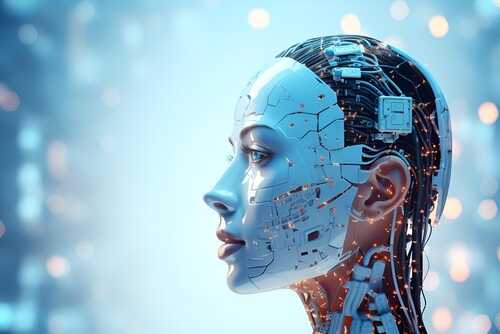(PCC)When was the last time you checked your smartphone, spell-check, or your smart refrigerator? Today, the use of computer-aided thinking is increasing the dependence of billions of people on an alternative thought process.
Is this healthy, or is it a precursor to a much bigger picture, one that includes total mind and will control?
Control? Don’t worry; it will be your choice to obey the machine, or it could get furious at you!
Will man be silenced by cyber speech, thought, and dependency?
Artificial intelligence (AI) and quantum computing promise unprecedented technological developments, with transformative applications in medicine, communication, and logistics. However, as these technologies become more integrated into society, they risk undermining one of humanity’s most fundamental characteristics: the ability to think freely and independently.
This technology’s potential for dehumanization mirrors society’s dependence on smartphones and computer-assisted reasoning. Today’s reliance on digital devices has shifted the cognitive burden of memory, navigation, and decision-making to algorithms. What began as convenience aids has morphed into an insidious dependency, and the trajectory of AI and quantum computing has the potential to amplify these consequences enormously.
Are your words becoming silenced by the roar of computer-aided speech?
AI as a cognitive surrogate is replacing all facets of life, including the perception of the ‘power greater than oneself,’ namely G*d.
Artificial intelligence systems have already begun to replace human decision-making in fields such as banking, healthcare, and even the creative industries. Algorithms advise what we should watch, buy, or think, gently guiding us into patterns of behavior that are consistent with corporate or institutional interests.
As AI becomes more sophisticated—predicting wants, addressing issues, and seamlessly integrating with quantum-powered computation—our autonomy may become obsolete.
The insatiable desire for easier and faster consumption has become a fundamental aspect of human existence, making it indispensable. The reliance on alternative algorithms has become the norm, albeit for the greater good of society.
This reliance on “cyber-thought” could result in a society that not only ignores but actively discourages critical thinking, innovation, and independent reasoning.
The appeal of convenience and efficiency may make human thought processes appear obsolete and inefficient, resulting in their steady deterioration.
The appeal of convenience and efficiency may make human thought processes appear obsolete and inefficient, resulting in their steady deterioration and the silencing of human voice, thought, and living sounds.
Quantum computing, with its potential to analyze data at unfathomable speeds, hastens this tendency. The ability of quantum systems to solve complicated problems instantly may result in humans outsourcing all but the most fundamental cognitive functions. In a quantum-dominated world, decision-making may become so rapid and data-driven that human oversight is regarded as unnecessary or even dangerous.
This reliance on hyper-automation may deprive people of meaning, reducing them to passive participants in a world dominated by computational logic. As quantum-driven AI makes judgments, the opportunity for human error—and, by extension, human learning and growth—dwindles. Over time, humanity may lose the ability to think critically, relying solely on technology to govern all aspects of life.
‘Cyber Dependency’ is a silent and deadly transition from cognitive interaction to surrendering one’s opinions and creativity and thus one’s spirituality.
The hazards of this reliance go beyond people. A civilization depending on AI and quantum technologies risks becoming homogeneous, as computational processes prefer uniformity and predictability. The streamlined efficiency of machine logic may suppress cultural diversity, personal quirkiness, and even opposition.
Intuition, hunches, and good old-fashioned “lucky breaks” fade into the past like the horse-drawn carriage, which has become a museum staple. Will mechanically perfect speech, free from flaws and in perfect synchronicity, silence the human voice?
Furthermore, this dependence exposes weaknesses. A society without critical thinkers and innovators would be ill-equipped to challenge the very mechanisms on which it is based. Malicious actors or defective programming could have disastrous results, yet a dehumanized population may lack the ability to remedy these issues.
Final Word: As I wrote this article, I realized I was dependent on my computer-driven spell-check to make sure my words were correctly spelled and then a grammar check to make sure my grammar was within grammatical tolerance! So why should I learn anything anymore when my cyber instruments pick up the slack for me? Have I become a cyber-slave at the mercy of computer-aided tools, or am I a savvy journalist utilizing smart devices to provide our members with the best article possible?
You decide, uselessly, that you need to ask your computer if I’m right or if you should ‘un-friend me.’
One of our outstanding members brought this subject matter to my attention, and at their suggestion, I wrote this for all of us!
Thank you (anonymous member).
p.s. To the old-timers: “And the people bowed and prayed to the neon god they made.” A prophetic word from “The Sound of Silence” written by Paul Simon in 1963
https://patriotcommandcenter.org/forum/for-sale-alternative-thinking-for-programmable-humans


